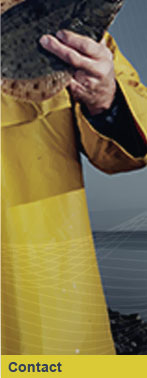Call for Papers
People and the Sea VI - Bridging Science and Policy for Sustainable Coasts and Seas
July 6-9, 2011
Since its inception in 2001, the international MARE People and the Sea conference has established itself as one of the leading interdisciplinary forums for debate and learning in the realm of maritime and coastal research and policy. The conference series started out with ambitions to clarify and catalyze contributions from the social sciences in improving understanding of complex maritime issues. Its success quickly engaged a wide range of scholars from other disciplines too, and participation boasts one of the most globally diverse combinations of scholars, policy makers and practitioners working on maritime and coastal issues today.
Whilst recognizing the achievements of maritime and coastal research over the last few decades, it remains the case that a large majority of coastal natural resources are still at risk, threatened by overexploitation, habitat degradation, inadequate governance and, more recently, the added pressures of climate change. Growing development pressures, from a diversity of sectors such as tourism, industry and urbanization, exacerbate risk and often place competing claims on limited resources. As a result, coastal resources, and the millions of men, women and children who depend upon them, face an uncertain future.
‘Bridging science and policy’, the central theme of the 6th MARE People and the Sea conference, addresses how science can better connect with policy to support progress towards sustainable coasts. This builds on a long-standing ambition of the MARE conferences to encourage interconnection amongst different sciences, with particular emphasis on social science and trans-disciplinary contributions across the science-policy interface. As is often observed, science frequently remains fragmented and contested, particularly across economic, social and natural science domains. The field of policy is no less problematic. Disciplinary orientations are often reproduced in the sectoral organization of government agencies and their policies. Policy-makers tend to reduce complex problems to simple and seemingly manageable proportions. This often leads to contestations in which scientific activity and knowledge become a weapon legitimizing certain understandings of environmental-societal problems and solutions and discarding others, rather than being a neutral input for an uncontested societal activity.
The 6th MARE conference specifically aims to re-connect the myriad of disciplines which seek to promote sustainable coasts with processes of policy and decision-making. By doing so, we endeavor to provide insight into the different framings of complex problems, and to bridge the common gap between scientific and policy domains. The underlying assumption here is that joined-up science which seeks to engage with the policy process can facilitate progress towards workable and sustainable fisheries and coastal policies that are socially, environmentally and politically workable.
Conference themes:
1) Maritime life worlds and culture
This theme continues a long standing attention of the MARE conference series to maritime anthropology and the cultural meanings that people associate with the sea and coastal zone. Papers in this theme may relate to occupational specializations, such as fishing, coastal tourism, aquaculture, or oil rig work. They may also branch into cultural ecology, history, film or literature analysis. Documentaries could be included in the programme.
Click HERE for the announcement of SPECIAL PANEL: 'DEVIANCE IN THE COASTAL ZONE'
2) Negotiating policies for marine resource use
This theme focuses on processes of governance giving particular attention to aspects of negotiation, consensus building, legitimacy, the role of science and interpretation of evidence, dealing with scientific uncertainty, and policy conflict. We are interested in how different policies in the coastal zone are deliberated, whose voices are heard, aspects of power, procedural justice, examples of good and bad practice, and consequences of policy contestation.
3) Coastal shocks, disasters and recovery
This theme gives focus to the reactions of coastal and marine systems to shocks and how science, policy and coastal communities deal with sudden change. As change may have natural (tsunamis, climate change, etc.) or social (policy, demographic developments, etc.), origins, contributors might address topics such as oil spills, fishing bans, resource collapse, the global recession or natural disasters affecting the coastal zone. Enquiries might highlight policy processes, law, power equations, the role of government, or of civil society.
4) Contrasting approaches and tools - Successes and failures in marine and coastal resource management
This theme brings together the different approaches and tools that are currently used in coastal and marine resource management, and seeks to contrast and compare their use across different contexts and disciplinary perspectives. We are particularly interested in articles which discuss management approaches, such as Marine Spatial Planning, Coastal Zone Management, Ecosystem based management, Wealth-based and Right-based approaches, and more specific management tools such as marine parks, ITQs, and quota regimes.
5) Fisher wellbeing and sustainable fisheries - challenges and opportunities
This theme addresses the challenges of poverty alleviation within fisheries in the context of diminishing resources, shifting access to resources, inequality and fast pace coastal development trends. How do these changes in fisheries affect the wellbeing of fishing dependent people and how can this be better understood and integrated into policy considerations? We encourage papers which address poverty in fisheries from across a north and south context.
Panel proposals
Panels are 1.5 hours in length and should contain 3 to 4 paper presentations. It is possible to submit proposals for a double panel. Panel sessions may also be used for round table discussions or the presentation and discussion of audiovisual material.
Panel proposals should clearly state:
- The name, affiliation, and email address of the panel organizer,
- The proposed paper abstracts, authors (and their affiliations) to be included in the panel,
- The conference theme to which the panel relates.
Please limit panel proposals to 1 side of A4 and submit electronically to the conference organizer Willeke Adriaanse by 15th February 2011.
Paper abstracts
Abstracts should clearly state:
- The author(s) name,
- Author(s) affiliation,
- Author email address for correspondence,
- The conference theme to which the article relates.
Please limit abstracts to 150 words and submit electronically to the conference organizer Willeke Adriaanse by 15th February 2011.
Please see www.marecentre.nl for further details and updates.
For guidelines for paper submissions, click here.
For guidelines for poster submissions, click here.

Centre for Maritime Research
Plantage Muidergracht 14-16
NL-1018 TV Amsterdam
Phone: +31 20 5254185
Fax: +31 20 5254051
Contact Form
